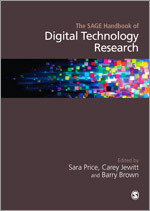The SAGE Handbook of Digital Technology Research
- Sara Price - Institute of Education, UK
- Carey Jewitt - University College London, UK
- Barry Brown - University of California San Diego, USA
This is a comprehensive, up-to-date resource for the twenty-first century. It addresses the key aspects of research within the digital technology field and provides a clear framework for readers wanting to navigate the changeable currents of digital innovation.
Main themes include:
- Introduction to the field of contemporary digital technology research
- New digital technologies: key characteristics and considerations
- Research perspectives for digital technologies: theory and analysis
- Environments and tools for digital research
- Research challenges
Aimed at a social science audience, it will be of particular value for postgraduate students, researchers and academics interested in research on digital technology, or using digital technology to undertake research.
'This Handbook provides a much-needed appraisal of the current state-of-play in social science approaches to the study of digital technologies. Its scope is impressive and it offers informed, comprehensive and critical coverage of the important debates in this key field of study'
This handbook is a big, brave synthesis of current research in digital technologies. [...]The book is aimed at social scientists with an existing interest in digital technology research, and goes beyond the usual ‘digital/virtual/online methods’ books by engaging with the technologies themselves and not just the ways in which social scientists use them. For social scientists who are less familiar with this field, the book provides a fascinating insight into the design and workings of the digital technologies that surround us.
This extensive, well-organized work...is not for the faint of heart. The discipline-specific content, highly sophisticated research, and germane terminology will put general readers at a disadvantage and may challenge interested professionals outside the field.... Throughout the text, scholars make projections on the future of digital technology and identify areas of weakness, and challenges and tensions that must be addressed in order to realize digital technology's full potential.... Summing Up: Highly recommended. Graduate students, researchers/faculty, and professionals.











